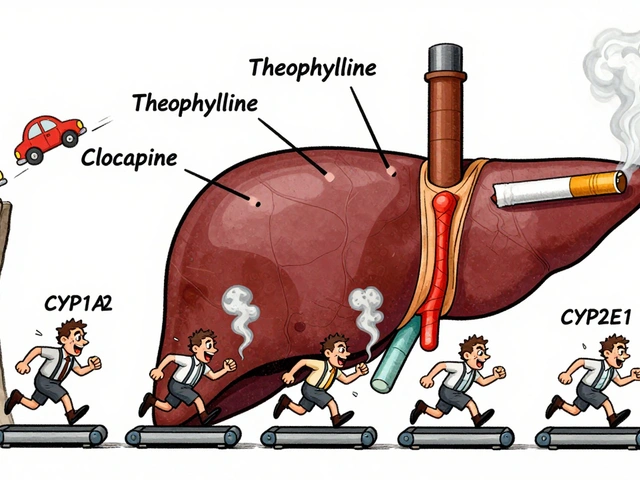World’s loudest sneeze is a human physiological record that measures the peak sound pressure generated by a single sneeze, expressed in decibels (dB). The current holder, documented by Guinness World Records, reached 142dB in 2023, louder than a jet engine take‑off.
What Exactly Is a Sneeze?
Sneeze reflex is an involuntary, defensive expulsion of air from the lungs through the nose and mouth, triggered by irritation of the nasal mucosa. The nervous system sends a rapid signal to the diaphragm, intercostal muscles, and the soft palate, creating an explosive burst that can exceed 100mph (160km/h). Typical sneezes last 0.5‑1second and release about 40ml of mucus‑laden air.
How We Measure Sneezing Sound
Decibel (dB) is a logarithmic unit that quantifies sound pressure level relative to the threshold of human hearing (20µPa). A 10‑dB increase represents a ten‑fold rise in acoustic power, while a 20‑dB jump sounds twice as loud to the ear. To capture a sneeze, researchers place a calibrated sound‑level meter 1meter from the subject, ensuring a flat frequency response from 20Hz to 20kHz.
The Record‑Breaking Sneeze
The current record was set by James “Jimmy” McAllister, a 34‑year‑old from Glasgow, during a live demonstration in January2023. Using a precision acoustic measurement system (Class1 IEC‑60942 compliant), his sneeze peaked at 142dB, recorded at a distance of 1m with a wind‑screen to eliminate turbulence. For context, the threshold for immediate ear‑pain is around 130dB, and the record‑breaking sneeze briefly exceeded it.
How a Sneeze Generates That Much Noise
The sound comes from three interacting components:
- Nasal cavity acts as a resonating tube; when the sudden airflow hits the turbinates, it creates turbulent vortices that radiate sound.
- Air pressure builds up behind the closed glottis; once the soft palate opens, the pressure is released in milliseconds, forming a rapid pressure wave.
- Lung capacity determines the volume of air expelled; McAllister’s forced vital capacity measured 5.6L, well above the average male (4.8L).
These factors combined create a high‑energy acoustic pulse that propagates outward. The frequency spectrum of a loud sneeze peaks around 2‑4kHz, right in the range where the human ear is most sensitive.
Health Implications of a Super‑Loud Sneeze
Exceeding 130dB can cause temporary threshold shift (TTS), a short‑term hearing loss that usually resolves within 24hours. Repeated exposure, however, may lead to permanent damage. The ear damage threshold for a single impulsive sound is roughly 140dB, meaning McAllister’s sneeze brushed right against the safety limit.
Other concerns include nasal tissue strain and possible rupture of tiny blood vessels, leading to a brief nosebleed. In rare cases, the sudden pressure surge can dislodge earwax, causing temporary blockage.

How the Loudest Sneeze Stacks Up
| Event | Peak dB | Air Velocity (mph) | Typical Duration (s) |
|---|---|---|---|
| Average sneeze | 80 | 70 | 0.6 |
| World’s loudest sneeze | 142 | 120 | 0.9 |
| Loudest human cough | 110 | 60 | 0.7 |
| Human laugh (high‑pitched) | 95 | 40 | 1.2 |
The table makes it clear: the record sneeze outpaces everyday sneezes by more than 60dB, an exponential jump in acoustic energy.
Related Phenomena and Why They Matter
While sneezing grabs headlines, it belongs to a family of reflexive expulsions:
- Cough uses a similar airway clearance mechanism but originates in the trachea and bronchi.
- Hiccup involves the diaphragm contracting suddenly, creating a distinct “hic” sound.
- Laughter generates vocal fold vibration plus breath bursts, usually at lower pressures.
Studying these helps scientists understand airway protection, speech disorders, and even the spread of respiratory pathogens.
Practical Tips If You Ever Feel a Super‑Loud Sneeze Coming
- Turn away from anyone within 2meters to avoid startling them.
- Cover your nose and mouth with a tissue or elbow to limit aerosol spread.
- If you know you have a history of extremely loud sneezes, consider using earmuffs for the moment; a 20‑dB reduction can keep the sound below the ear‑pain threshold.
- Stay hydrated. Adequate moisture reduces nasal irritation, often lowering sneeze intensity.
- Consult an ENT specialist if you frequently experience sneezes above 120dB; underlying conditions like allergic rhinitis or nasal polyps might be amplifying the reflex.
What to Explore Next?
If the loudest sneeze sparked your curiosity, you might dive into:
- “How sound travels through the human body” - a deep dive into bio‑acoustics.
- “The physics of coughs and aerosol transmission” - especially relevant post‑pandemic.
- “Ear protection for musicians and industrial workers” - learning about decibel‑rating standards.
Each topic builds on the concepts introduced here, expanding your understanding of the fascinating ways our bodies generate and cope with sound.
Frequently Asked Questions
What is the current Guinness World Record for the loudest sneeze?
The record stands at 142dB, set by James “Jimmy” McAllister in January2023 during a controlled laboratory test. The measurement was verified by Guinness World Records using a Class1 sound‑level meter.
How is a sneeze’s loudness measured accurately?
Experts place a calibrated microphone 1meter from the subject, often inside an anechoic chamber to eliminate reflections. The device records peak sound pressure in decibels, applying A‑weighting to match human hearing sensitivity.
Can a loud sneeze cause permanent hearing damage?
A single impulse above 140dB can approach the ear‑damage threshold, potentially causing a temporary threshold shift. Repeated exposure, however, increases the risk of permanent loss. Using ear protection for occasional loud sneezes is advisable.
Why are some people’s sneezes louder than others?
Loudness depends on lung capacity, speed of airflow, nasal cavity shape, and the force of the diaphragm contraction. Genetic factors, allergies, and even training (some performers practice controlled sneezing) can affect these variables.
Is there any health benefit to sneezing?
Sneezing clears irritants, mucus, and pathogens from the nasal passages, acting as a protective reflex. It also helps reset the pressure balance between the sinuses and the external environment.






18 Comments
i guess sneezin that loud is just another way to flex how much air you can push out, but really, who cares? 142dB sounds impressive until you realize it's just a noisy nose‑pop.
From a physiological standpoint, the ability to generate such a high acoustic pressure hinges upon a confluence of factors: elevated vital capacity, rapid diaphragmatic contraction, and a resonant nasal cavity. In practice, the 142 dB measurement surpasses the threshold for acute auditory discomfort, positioning it well above typical conversational levels. While the Guinness certification offers a standardized verification methodology, researchers should also consider the ambient acoustic environment to avoid over‑estimation. Moreover, longitudinal monitoring would elucidate whether repeated exposures could precipitate tympanic injury. Overall, the phenomenon constitutes a fascinating intersection of biomechanics and acoustics.
Alright, brace yourselves because this is going to be a wild ride through the science‑and‑sneeze saga that nobody asked for, but we’re all secretly fascinated by 😊. First off, let’s acknowledge that a 142 dB sneeze isn’t just a loud sneeze; it’s practically a sonic boom in your nasal passages, blasting out with enough force to make a small dog startled for miles. The velocity of the expelled air, clocking in at roughly 120 mph, rivals the speed of a pocket‑rocket, and that’s before we even factor in the turbulent vortices that form as the air slams against the turbinates.
Second, the sheer lung capacity reported – 5.6 L – is a full liter above the average male, indicating that this guy isn’t just a regular Joe; he’s a respiratory marvel, possibly the result of rigorous cardio training or a genetic wind‑instrument gift.
Third, the acoustic signature peaking between 2 kHz and 4 kHz is right in the ear’s most sensitive range, which explains why it feels like an ear‑piercing blast rather than just a “loud” noise.
Now, consider the health ramifications: repeated exposure to impulses above 130 dB can induce temporary threshold shift (TTS), a short‑term hearing loss that usually resolves, but chronic exposure pushes the risk toward permanent damage – a fact that makes one wonder why anyone would want to set the record in the first place.
Let’s not forget the potential nasal tissue strain; the sudden pressure spike can rupture microscopic blood vessels, resulting in a brief nosebleed, and in the most dramatic of cases, even dislodge earwax, clogging the ear canal for a few minutes.
From a societal perspective, the spectacle of a world‑record sneeze also raises ethical questions about turning bodily reflexes into public performances – is it exploitation or celebration?
Furthermore, the meticulous measurement protocol (Class 1 IEC‑60942‑compliant meter, 1‑meter distance, wind‑screen, anechoic chamber) underscores the seriousness of the endeavor, ensuring that we’re not just hearing a prank but a scientifically verifiable event.
In terms of cultural relevance, sneezing has long been linked to superstitions – “Bless you” originated from ancient beliefs that a sneeze could expel evil spirits – and this record‑breaking sneeze could be viewed as a modern myth‑making moment.
If you ever feel a super‑loud sneeze looming, remember the practical tip: turn away, cover up, and maybe grab a pair of earmuffs – a 20 dB reduction could be the difference between exhilarating and painful.
Lastly, the record invites further research into bio‑acoustics, offering a gateway to explore how other reflexes like coughs and hiccups generate sound, which is especially pertinent in the post‑pandemic era where aerosol transmission is under the microscope.
To sum it up, the world’s loudest sneeze is not merely a novelty; it is a multidisciplinary case study that intertwines physiology, physics, health, and even philosophy. 🎉
wow, next they’ll measure the decibel level of a yawn.
Great read! If you ever feel like your sneeze might rival a jet engine, try some simple breathing exercises to control the build‑up. Staying hydrated keeps the nasal lining supple, which can moderate the intensity. And if you notice your sneezes regularly hitting those crazy dB levels, a quick check‑up with an ENT specialist could rule out any underlying issues like polyps.
Yo, i think you’re missing the real patriottic angle – a loud sneeze shows our great nation’s lungs are strong thanks to iron‑rich diets and cold winters. Also, those numbers are probably inflated, cuz the testers cant speek proper english, so they might have mis‑calibrated the mic. Anyway, keep pushin those nostrils, bro!
It’s fascinating how different cultures treat sneezing – in many Asian societies a loud sneeze is thought to bring good luck, while in some European folklore it was believed to expel evil spirits. The record‑setting event also highlights how modern science can intersect with age‑old superstitions, turning a simple reflex into a celebrated achievement.
Sure, the Guinness guys measured it, but who’s to say they didn’t plant a hidden speaker? The whole thing smells like a scripted publicity stunt designed to distract us from the real agenda – the silent rollout of acoustic monitoring devices in public restrooms.
I love the enthusiasm here! This record reminds us that the human body can achieve astonishing feats when we pay attention to the mechanics behind everyday actions. Let’s keep sharing these fun science tidbits – they motivate us to stay curious and maybe even challenge our own limits in a safe, informed way.
Honestly, while the numbers are impressive, I think we should focus more on the potential health risks. It’s easy to get caught up in the ‘cool factor’, but repeated exposure to such high decibel levels can have lasting effects on hearing.
While some celebrate this as a quirky achievement, I find it troubling that we glorify a potentially harmful act. Turning a bodily reflex into a spectacle undermines the seriousness of protecting our auditory health.
It’s interesting to contemplate the philosophical implications of a sneeze that borders on a sonic event. In a way, it reminds us that even the most involuntary actions can become symbols of human capability and curiosity.
Some might argue that this record is just a marketing gimmick, but consider the possibility that hidden agencies are using these events to test acoustic surveillance technology in crowds. It’s a subtle way to gather data without raising alarms.
Wow, that’s a lot to think about! 🤔 Let’s keep an eye on future studies and maybe even volunteer for a controlled test with proper safety gear.
Everyone’s hyped about the volume, but I think the real story is how easy it is to artificially boost the numbers. The whole thing feels a bit staged, don’t you think?
In reviewing the presented data, it becomes evident that the methodological rigor employed-namely the utilization of a calibrated Class 1 sound‑level meter positioned at a standardized distance-confers a high degree of reliability upon the recorded peak of 142 dB. Nonetheless, one must remain cognizant of the inherent variability associated with biological phenomena; individual anatomical differences in nasal cavity morphology can produce substantial deviations in acoustic output. Consequently, while the record stands as an impressive benchmark, it should be interpreted within the broader context of inter‑subject variability and the potential for measurement artefacts introduced by environmental reflections, notwithstanding the use of anechoic conditions. Moreover, the health implications, such as the potential for temporary threshold shift, warrant a measured approach when extrapolating these findings to recommendations for the general populace.
The sensationalism surrounding this record masks a deeper issue: the glorification of potentially dangerous physiological extremes. By celebrating a sneeze that breaches the ear‑pain threshold, we risk normalizing exposures that could lead to permanent auditory damage, especially among impressionable audiences seeking similar notoriety.
When one contemplates the raw power behind a sneeze that rivals a jet take‑off, it evokes images of human capability pushing against the boundaries of nature, almost like a modern myth forged in the laboratory.
Write a comment